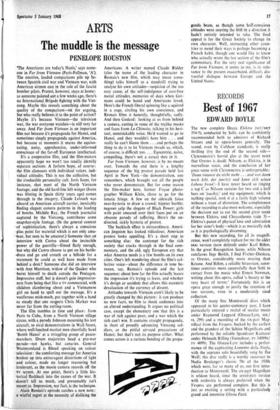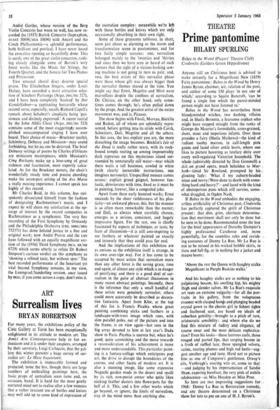Best of 1967
RECORDS EDWARD BOYLE
The new complete Decca Elektra (SET/MET 354-5), conducted by Solti, can be confidently recommended both to admirers of Richard Strauss and to opera-lovers generally. The sound, even by Culshaw standards, is really thrilling (try the end of the second side- Clytemnestra's horrid glee at the secret news that Orestes is dead). Nilsson, as Elektra, is in marvellous voice, and the conclusion of her great scene with Clytemnestra is unforgettable: 'Dann triiumst du nicht mehr . . . and wer dente noch lebt, der jauchzt and kann sick seines Lebens freun'—I have never heard so ringing a top C as Nilsson sustains for two and a half bars on Vauchzt,' and my equipment, which is nothing special, took it at a fairly high volume without a trace of distortion. The completeness of the recording is also most welcome, especially the decision not to cut the second great scene between Elektra and Chrysothemis (side 3)— EJektra's paean of physical love and admiration for her sister's body—which is as musically rich as it is psychologically discerning.
But this new recording, for all its magnifi- cence, won't completely replace for me the older DOG version (now deleted) under Karl Bohm. In the great Recognition Scene, while Nilsson outclasses Inge Borkh, I find Fischer-Dieskau, as Orestes, considerably more moving than Krause. And Bohm, a reliable Straussian, some- times contrives more successfully than Solti to extract from the music what Ernest Newman, writing about this opera, called `a beauty at, the very heart of terror.' Fortunately this is an opera great enough to justify the retention of two versions, even in a moderately sized collection.
Of the many fine Monteverdi discs which appeared in his quater-centenary year, I have particularly enjoyed a recital of secular music under Raymond Leppard (Oiseau-Lyre, sot./ ot_ 299) and a. recording of the six-part Mag- nificat from the Vespers, backed by the earliest and the grandest of the Schutz Magnificats and performed by the reliable Spandauer Kantorei under Helmuth Rilling (Turnabout, Tv 34099s/ TV 4099). The Oiseau-Lyre includes a perfor- mance of the captivating Lamento della Ninfa, with the soprano solo beautifully sung by Ilse Wolf; this disc really is a worthy successor to Nadia Boulanger's classic 78s of the 1930s which were, for so many of us, our first intro- duction to Monteverdi. The six-part Magnificat is seldom heard, since the seven-part version with orchestra is always preferred when the Vespers are performed complete. But this is just as exciting a setting with a particularly grand and inventive Gloria Patti. Andre Gertler, whose version of the Berg Violin Concerto has worn so well, has now re- corded the (1937) Bartok Concerto (Supraphon, SUAST 50696/suA 10696) with Ancerl and the Czech Philharmonic—a splendid performance, both brilliant and poetical; I have never heard the evocative opening so beautifully done. This is surely one of the great violin concertos, rank- ing closely alongside some of Bartok's very finest works like the Music for Strings, the Fourth Quartet, and the Sonata for Two Pianos and Percussion.
Two unusual choral discs deserve special praise. The Elizabethan Singers, under Louis Halsey, have recorded a most attractive selec- tion of Schubert Partsongs (Argo, ZRG /RG 527), and I have been completely `hooked' by Der Gondelfahrer—a captivating barcarolle whose second verse, especially, recalls Richard Capell's remark about Schubert's simplicity being 'pas- sionate and divinely expressed.' A recent recital by the John Alldis Choir (Argo, ZRG/RG 523) contains some of the most staggeringly accom- plished unaccompanied singing I have .ever heard. Their choice of music—Bruckner (early), Schonberg, Debussy and Messiaen—may sound forbidding, but let no one be deterred. The brief Debussy settings of poems by Charles d'Orleans are miniature masterpieces, while Messiaen's Cinq Rechants make up a love-song of great richness and fascination, most expertly calcu- lated. As for the Bruckner motets, the choir's wonderfully steady tone and precise chording make the seven-part setting of the Ave Maria a really moving experience. I cannot speak too highly of this record.
Mr Charles Reid, in this column, has out- spokenly dissociated himself from the fashion of denigrating Rachmaninov's music, and .I expect he will share my satisfaction at the up- surge of interest by the record companies 'in Rachmaninov as a symphonist. The very fine recording of the First Symphony by Ormandy and the Philadelphia Orchestra (CBS, SBRG/BRG 752571) has done belated justice to a fine and original work; now Andre Previn and the Lso have followed with an equally magnificent ver- sion of the (1936) Third Symphony (RCA, sa/itia 6729) which seems utterly to refute Dr Robert Simpson's curious verdict on this symphony as `showing a refined taste, but without spur.' The best recorded performance of the luxuriant yet vital Second Symphony remains, in my view. the Lenirigrad/Sanderling version, once issued by DGO; if you come across a copy, don't miss it.



































 Previous page
Previous page